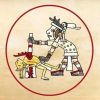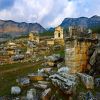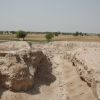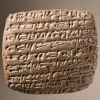-
 +2 +1
+2 +1Lovers of Wisdom
Diogenes Laertius compiled the sole extant work from antiquity that gives anything like a comprehensive picture of Greek and Hellenistic philosophy. He may have been a flaming mediocrity. He may have been credulous and intellectually shallow. He may have produced a scissors-and-paste job cribbed from other ancient sources. But those other sources are lost, which makes what Diogenes Laertius left behind, to quote the Routledge Encyclopedia of Philosophy, “truly priceless.” By Jim Holt.
-
 +12 +1
+12 +1Life on the slippery Earth
Aztec moral philosophy has profound differences from the Greek tradition, not least its acceptance that nobody is perfect. By Sebastian Purcell.
-
 +10 +1
+10 +1Azul Maya: not only a pigment but a high-end nanomaterial used by the ancient Maya
When we talk about Maya heritage, one of the most important legacies in the Yucatan Peninsula is the “Azul Maya” (Maya Blue), a pigment developed widely by this civilization and used by different Mesoamerican cultures for the decoration of ceramics, textiles and murals, as explained by Romeo de Coss Gómez, researcher attached to the Center for Research and Advanced Studies (Cinvestav) in Mérida, Yucatán.
-
 +3 +1
+3 +1Israelites
Desmond Dekker & The Aces
-
 +16 +1
+16 +1What if humans weren't the first civilization on Earth?
Is it possible that modern humans aren't the first civilization on Earth? This is the insanely interesting question probed by "The Silurian Hypothesis", a new paper authored by Gavin A. Schmidt and Adam Frank, two NASA scientists. As they point out, if an industrialized civilization existed in the deep past, it's not clear there'd be easily recognizable traces of it. Our geologic record doesn't go back any further than the Quaternary period of about 2.6 million years ago.
-
 +10 +1
+10 +1Was There a Civilization On Earth Before Humans?
It only took five minutes for Gavin Schmidt to out-speculate me. Schmidt is the director of nasa’s Goddard Institute for Space Studies (a.k.a. GISS) a world-class climate-science facility. One day last year, I came to GISS with a far-out proposal. In my work as an astrophysicist, I’d begun researching global warming from an “astrobiological perspective.” That meant asking whether any industrial civilization that rises on any planet will, through their own activity...
-
 +2 +1
+2 +1We probably won’t hear from aliens. But by the time we do, they’ll be dead
Astronomers build on the Drake Equation to probe the chance that humans will find existing aliens. The answer: Not likely. By Lisa Grossman.
-
 +2 +1
+2 +1Sex and death in the classical world
From striking coffin portraits to boldly erotic statues, the art of the Romans and Greeks tells us compelling stories about how they lived, died, and loved. By Mary Beard.
-
 +13 +1
+13 +1How to change the course of human history
The story we have been telling ourselves about our origins is wrong, and perpetuates the idea of inevitable social inequality. David Graeber and David Wengrow ask why the myth of 'agricultural revolution' remains so persistent, and argue that there is a whole lot more we can learn from our ancestors.
-
 +19 +1
+19 +1White Settlers Buried the Truth About the Midwest’s Mysterious Mound Cities
Pioneers and early archaeologists credited distant civilizations, not Native Americans, with building these sophisticated complexes
-
 +26 +1
+26 +1How the Roman “Gates of Hell” Killed Animal Sacrifices but Let Human Priests Escape Unharmed
In ancient times, the gates seemed to respond to supernatural powers, but it's actually all about science. By Julissa Treviño.
-
 +2 +1
+2 +1In Sudan, Rediscovering Ancient Nubia Before It's Too Late
Long ignored by white archaeologists as a mere footnote, modern scientists are now racing to document what's left of the ancient African civilization. By Amy Maxmen.
-
 +28 +1
+28 +1Hunting for the ancient lost farms of North America
2,000 years ago, people domesticated these plants. Now they’re wild weeds. What happened? By Annalee Newitz.
-
 +13 +1
+13 +1Peru’s alpine herders revive ancient technologies to face the future
Indigenous communities are restoring abandoned dams, reservoirs and canals that date back over 3,000 years. By Thin Lei Win.
-
 +16 +1
+16 +1Fish, Farm, or Fight
A new study is examining how Vikings adapted to climate change. By Zach Zorich.
-
 +21 +1
+21 +1The College Student Who Decoded the Data Hidden in Inca Knots
Manny Medrano cut loose on spring break by analyzing a set of khipus. By Katherine Davis-Young.
-
 +23 +1
+23 +1Mystery Solved: How the Ancient Indus Civilization Survived Without Rivers
The rise and fall of the Indus civilization gets a new narrative. By Stephanie Pappas.
-
 +18 +1
+18 +1Ancient data, modern math and the hunt for 11 lost cities of the Bronze Age
The research may help archaeologists discover ruins of cities from the ancient world. By Christopher Ingraham.
-
 +34 +1
+34 +1The Hidden Science and Tech of the Byzantine Empire
Byzantine civilization, the eastern Roman empire whose capital was at Constantinople, is mostly known today for its spirituality and eccentricities. In reality, Byzantium was also a pragmatic and down-to-earth culture, and it also exhibited prowess in science and technology. By Anthony Kaldellis.
-
 +13 +1
+13 +1From Prejudice to Pride
In the 20th century, Japanese anthropologists and officials tried to hide the existence of the Indigenous Ainu. Then the Ainu fought back like their cousins, the bears. By Jude Isabella.
Submit a link
Start a discussion




















